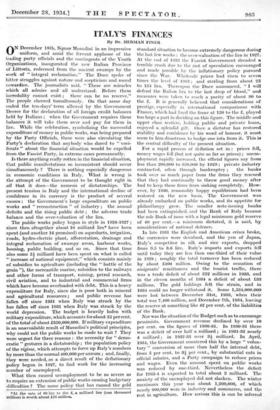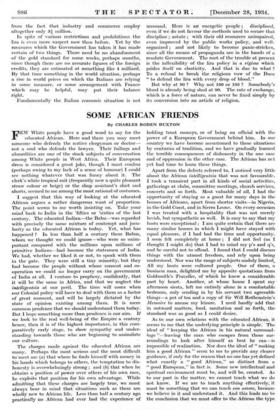ITALY'S FINANCES
By Dr. HERMAN FINER
ON December 18th, Signor Mussolini in an impressive uniform, and amid the fervent applause of the leading party officials and the contingents of the Youth Organizations, inaugurated the new Italian Province of Littoria, redeemed from the ancient swamps by the work of " integral reclamation." The Duce spoke of bitter struggles against nature and scepticism and moral cowardice. The journalists said, " These are miracles which all admire and all understand. Before them incredulity cannot exist ; there can be no reserve." The people cheered tumultuously. On that same day ended the ten-days' term allowed by the Government Decree for the declaration of all foreign credit balances held by Italians ; when the Government requires these balances it will take them over and pay for them in lire. While the celebration, symbolizing the successful expenditure of money in public works, was being prepared by the Party Officials, these were also circulating the Party's declaration that anybody who dared to " voci- ferate " about the financial situation would be expelled from the Fascist Party, in extreme cases permanently.
Is.there anything really rotten in the financial situation, that public manifestations so inconsistent should occur simultaneously ? There is nothing especially dangerous in economic conditions in Italy. What is wrong is the attempt of the Government to be thought right in all that it does—the nemesis of dictatorships. The present tension in Italy and the international decline of confidence in its currency is the product of several causes : the Government's large expenditure on public works and " reconstruction " of industry ; the annual deficits and the rising public debt ; the adverse trade balance and the over-valuation of the lira.
The public works policy began in style in 1926-1927 ; since then altogether about 16 milliard lire* have been .spent (and another 16 promised) on aqueducts, irrigation, roads, hydro-electric plant, afforestation, drainage and integral reclamation of swampy areas, harbour works, housing, public building, and so on. Since that time also some 54 milliard have been spent on what is called " increase of national equipment," which consists mainly of subsidies to agriculture (including the " battle of the grain "), the mercantile marine, subsidies to the railways and other forms of transport, mining, petrol research, civil aviation, and to industrial and commercial firms which have become overloaded with debt. This is a heavy expenditure for Italy, since she is poor both in mineral and agricultural resources ; and public revenue has fallen off since 1931 when Italy was struck by the has fallen off since 1931 when Italy was struck by the world depression. The budget is heavily laden with military expenditure, which accounts for about 25 per cent. of the total of about £850,000,000. If military expenditure is an unavoidable result of Mussolini's political principles, why could not the public works be made to wait ? They were urgent for three reasons : the necessity for " demo- cratic " gestures in a dictatorship ; the population policy of the regime, which attempts to force up Italy's numbers by more than the normal 400,000 per annum ; and, finally, they were needed, as a direct result of the deflationary policy begun in 1927, to find work for the increasing number of unemployed. What then caused unemployment to be so severe as to require an extension of public works causing budgetary difficulties ? The same policy that has caused the gold
*At the rate of 60 lire to the £, a milliard lire (one thousand million) is worth about £16 million.
standard situation to become extremely dangerous during the last few weeks : the over-valuation of the lira in 1927. At the end of 1926 the Fascist Government dreaded a terrible crash due to the riot of speculation encouraged and made possible by the inflationary policy pursued since the War. Wholesale prices had risen to seven times the level of 1913 ; and sterling from about 25 to 154 lira. Thereupon the Duce announced, " I will defend the Italian lira to the last drop of blood," and measures were taken to reach a parity of about 90 to the £. It is generally believed that considerations- of prestige, especially in international comparisons with France, which had fixed the franc at 120 to the £, played too large a part in deciding on this figure. The middle and upper class rentiers, holding public and private loans, enjoyed a splendid gift. Once a dictator has restored stability and confidence by his word of honour, it must seem to him disastrous to budge one iota from it. This is the central difficulty of the present situation.
For a rapid process of deflation set in : prices fell, money wages fell (but not quite so far as prices) ; unem- ployment rapidly increased, the official figures say from less than 200,000 to 650,000 by 1929 ; private industry contracted, often through bankruptcy ; the banks took over so much paper from the firms they rescued that they had continually to throw good money after bad to keep those firms from sinking completely. How- ever, by 1930, reasonably happy equilibrium had been restored on the new basis. The Government was already embarked on public works, and its appetite for philanthropy grew. The smaller note-issuing banks had been extinguished, and the Bank of Italy became the sole Bank of issue with a legal minimum gold reserve of 40 per cent.—a minimum dictated, it is said, by considerations of national defence.
In late 1931 the English and American crises broke, the currencies were devalued, and the yen of Japan, Italy's competitor in silk and rice exports, dropped from 9.5 to 8.6 lire. Italy's imports and exports fell until today they are less than one-third of their value in 1928; roughly the total turnover has been reduced by about £400 million. Owing to the cessation of emigrants' remittances and the tourist traffic, there was a trade deficit of about £22 millions in 1988, and in the eleven months of 1934 a deficit of about £88 millions. The gold holdings felt the strain, and in 1934 could no longer withstand it. Some 1,584,000,000 were lost between December 81st, 1988, when their total was 7,400 million, and December 7th, 1934, leaving the reserve at something like 42 per cent. of the liabilities of the Bank.
Nor was the situation of the Budget such as to encourage pessimists. Government revenue declined by over 10 per cent. on the figures of 1980-81. In 1980-81 there was a deficit of over half a milliard ; in 1981-82 nearly 4 milliard ; in 1982-88 over 84 milliard. In April, 1984, the Government countered this by a large " volun- tary " conversion of more than half the internal debt, from 5 per cent. to 84 per cent., by substantial cuts in official salaries, and a Party campaign to reduce prices and wages. Even the amount spent on public works was reduced by one-third. Nevertheless the deficit for 1938-4 is expected to total about 2 milliard. The anxiety of the unemployed did not slacken. The winter maximum this year was about 1,200,000, of which nearly 900,000' were in industry and commerce, and the rest in agriculture. How serious this is can be inferred from the fact that industry and commerce employ altogether only 3i million.
In spite of various restrictions and prohibitions the lira is even more suspect now than before. Yet by the measures which' the Government has taken it has made certain of two things. There need be no abandonment of the gold standard for some weeks, perhaps months, since though there are no accurate figures of the foreign credits, they are estimated at something like 4 milliard. By that time something in the world situation, perhaps a rise in. world prices on which the Italians are relying in some measure, or some arrangement with France which may be helpful, may put their balance right.
Fundamentally the Italian economic situation is not unsound. Here is an energetic people ; even if we do net favour the methods used to secure that discipline ; astute ; with their old resources unimpaired, even improved by the public works policy, and well- organized ; and not likely to become panic-stricken, since all the means of propaganda are in the hands of a resolute Government. The root of the trouble at present is the inflexibility of the lira policy in a regime which prides itself on elasticity. And that is due to what ? To a refusal to break the religious vow of the Duce " to defend the lira with every drop of blood."
But why at 90 ? Why not 100 or 105 ? Somebody's blood is already being shed at 90. The rate of exchange, which is a force of nature, can never be fixed simply by its conversion into an article of religion.



































 Previous page
Previous page